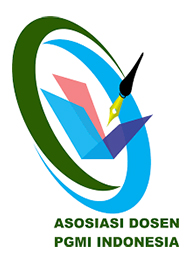The Problem with the Implementation of Cooperative Learning in Speaking Classes for Elementary School
Abstract
Despite the well-established benefits of cooperative learning, implementation remains a challenge. This research aims to know the problems teachers face in implementing cooperative learning in speaking classes in elementary school. This study used a qualitative design with an interview approach with teachers to investigate problems in implementing cooperatives. This study report involves one teacher who has participated and has implemented cooperative learning for at least three years. The current study uses the interview data collection method to investigate the implementation of cooperative learning in MI TPI Keramat. The result indicates some problems the teacher faced in implementing cooperative learning in the classroom. The main problem faced by students in cooperative learning is group conflict.
Keyword : cooperative learning, speaking class, elementary school
Full Text:
PDFReferences
Alghamdy, R. Z. (2019). EFL learners' reflections on cooperative learning: Issues of implementation. Theory and Practice in Language Studies, 9(3), 271-277.
Anggraini, P. P., Apriliani, N. A., Supeni, I., & Handrianto, C. (2022). The use of the cocomelon youtube channel as a medium for introducing children's english vocabulary. SAGA: Journal of English Language Teaching and Applied Linguistics, 3(2), 81-90. https://doi.org/10.21460/saga.2022.32.137
Arwin, A., Kenedi, A. K., Anita, Y., & Handrianto, C. (2022, June). The design of covid-19 disaster mitigation e-module for students of grades 1 in primary school. In 6th International Conference of Early Childhood Education (ICECE-6 2021) (pp. 173-176). Atlantis Press. https://doi.org/10.2991/assehr.k.220602.036
Baloche, L., & Brody, C. M. (2017). Cooperative learning: Exploring challenges, crafting innovations. Journal of Education for Teaching, 43(3), 274-283.
Brown, J., Broderick, A. J., & Lee, N. (2007). Word of mouth communication within online communities: Conceptualizing the online social network. Journal of interactive marketing, 21(3), 2-20.
Buchs, C., Filippou, D., Pulfrey, C., & Volpé, Y. (2017). Challenges for cooperative learning implementation: Reports from elementary school teachers. Journal of education for teaching, 43(3), 296-306.
Dewi, H. (2016). Project based learning techniques to improve speaking skills. English Education Journal, 7(3), 341-359.
Ehsan, N., Vida, S., & Mehdi, N. (2020). The impact of cooperative learning on developing speaking ability and motivation toward learning English. Journal of Language and Education, 5(3), 19.
Fernandez-Rio, J., Sanz, N., Fernandez-Cando, J., & Santos, L. (2017). Impact of a sustained Cooperative Learning intervention on student motivation. Physical Education and Sport Pedagogy, 22(1), 89-105.
Goodyear, V. A. (2017). Sustained professional development on cooperative learning: Impact on six teachers' practices and students' learning. Research quarterly for exercise and sport, 88(1), 83-94.
Handrianto, C., Jusoh, A. J., Goh, P. S. C., Rashid, N. A., & Rahman, M. A. (2020). The Role of Teachers in Drug Abuse Prevention in Schools. International Journal of Academic Research in Business and Social Sciences. 10(11), 708-716. http://dx.doi.org/10.6007/IJARBSS/v10-i11/8131
Handrianto, C., Jusoh, A. J., Nengsih, Y. K., Alfurqan, A., Muslim, M., & Tannoubi, A. (2021). Effective pedagogy in primary education: A review of current literatures. Abjadia: International Journal of Education, 6(2), 134-143. https://doi.org/10.18860/abj.v6i2.12978
Herlina, S., Rahman, M. A., Nufus, Z., Handrianto, C., & Masoh, K. (2021). The development of students’ learning autonomy using tilawati method at a madrasatul quran in south kalimantan. Jurnal Pendidikan Agama Islam, 18(2), 431-450. https://doi.org/10.14421/jpai.2021.182-12
Isjoni, I. (2009). Cooperative learning. Bandung: Alfabeta.
Johnson, D. W., Johnson, R. T., & Smith, K. A. (2014). Cooperative learning: Improving university instruction by basing practice on validated theory. Journal on Excellence in University Teaching, 25(4), 1-26.
Kandasamy, C., & Habil, H. (2018). Exploring cooperative learning method to enhance speaking skills among school students. LSP International Journal, 5(2).
Khairunnisa, N., Rahman, M., & Handrianto, C. (2022). English digital literacy practices inside and outside class to develop students’ speaking skills. Pedagogy: Journal of English Language Teaching, 10(1), 13-24. https://doi.org/10.32332/joelt.v10i1.3790
Maulida, D. S., Rahman, M. A., Handrianto, C., & Rasool, S. (2022). A review of the blended learning as the model in improving students` paragraph writing skills. Abjadia: International Journal of Education, 7(1), 59-72. https://doi.org/10.18860/abj.v7i1.15901
Namaziandost, E., Homayouni, M., & Rahmani, P. (2020). The impact of cooperative learning approach on the development of EFL learners’ speaking fluency. Cogent Arts & Humanities, 7(1), 1780811.
Namaziandost, E., & Nasri, M. (2019). A meticulous look at Long’s (1981) interaction hypothesis: does it have any effect on speaking skill. Journal of Applied Linguistics and Language Research, 6(2), 218-230.
Nasri, M., & Biria, R. (2017). Integrating multiple and focused strategies for improving reading comprehension and l2 lexical development of Iranian intermediate EFL learners. International Journal of Applied Linguistics and English Literature, 6(1), 311-321.
Nengsih, Y. K., & Handrianto, C. (2022). Andragogi: Seni membelajarkan orang dewasa. Palembang: Bening Media Publishing.
Olsen, R. & Kagan, S. (1992). About cooperative learning. In Kessler, C. (Ed.), Cooperative Language Learning. (1-30). New Jersey: Prentice Hall.
Pattanpichet, F. (2011). The effects of using collaborative learning to enhance students English speaking achievement. Journal of College Teaching & Learning (TLC), 8(11), 1-10.
Pernantah, P. S., Rizatunnita, R., Kusnilawati, L., & Handrianto, C. (2022). Implementasi pembelajaran tatap muka (PTM) terbatas selama masa pandemi covid-19 di sma n 1 kubu. Pedagogi: Jurnal Ilmu Pendidikan, 22(1), 46-52. https://doi.org/10.24036/pedagogi.v22i1.1257
Pernantah, P. S., Rizka, M., Handrianto, C., & Syaputra, E. (2022). Inovasi bahan ajar pendidikan IPS berbasis digital flipbook terintegrasi local wisdom dalam menunjang perkuliahan jarak jauh. J-PIPS (Jurnal Pendidikan Ilmu Pengetahuan Sosial), 8(2), 136-145. https://doi.org/10.18860/jpips.v8i2.14886
Rahman, M. A., Handrianto, C., & Jamalullail, J. (2021). An overview of the implementation of musical drama in the introduction to literature course. Indonesian Journal of Educational Assessment, 4(2), 9-19. https://doi.org/10.26499/ijea.v4i2.156
Rahman, M. A., & Ja’afar, H. (2018). A review of the mingle model as a new technique in teaching speaking: Indonesian context. LET: Linguistics, Literature and English Teaching Journal, 7(2), 181-194. http://dx.doi.org/10.18592/let.v7i2.1949
Rahman, M. A., Melliyani, M., Handrianto, C., Erma, E., & Rasool, S. (2022). Prospect and promise in integrating multiliteracy pedagogy in the english language classroom in indonesia. Eternal (English, Teaching, Learning, and Research Journal), 8(1), 34-52. https://doi.org/10.24252/Eternal.V81.2022.A3
Rahman, M. A., Novitasari, D., Handrianto, C., & Rasool, S. (2022). Assessment challenges in online learning during the covid-19 pandemic. KOLOKIUM Jurnal Pendidikan Luar Sekolah, 10(1). https://doi.org/10.24036/kolokium.v10i1.517
Rais, A. D., & Sulistyawati, H. (2014). Improving students’ reading comprehension using jigsaw. English Education, 2(3), 323-330.
Ramadhani, D., Kenedi, A. K., Helsa, Y., Handrianto, C., & Wardana, M. R. (2021). Mapping higher order thinking skills of prospective primary school teachers in facing society 5.0. Al Ibtida: Jurnal Pendidikan Guru MI, 8(2), 178-190. http://dx.doi.org/10.24235/al.ibtida.snj.v8i2.8794
Ramadhani, D., Kenedi, A. K., Rafli, M. F., & Handrianto, C. (2022). Advancement of STEM-based digital module to enhance HOTS of prospective elementary school teachers. Jurnal Pendidikan Progresif, 12(2), 981-993. http://dx.doi.org/10.23960/jpp.v12.i2.202245
Rouzi, K. S., Chirzin, M., Anis, M., & Azhar, M. (2020). Synergizing parenting style between sacred text and baumrind’s context. International Journal of Scientific & Technology Research, 9(2), 1421-1427.
Rouzi, K. S., Suud, F. M., & Chaer, M. T. (2021). Humanized collective awareness in islamic education for public prosperity: A cross-cultural and religious psychological study. An-Nuha: Jurnal Kajian Islam, Pendidikan, Budaya Dan Sosial, 8(1), 33-45. https://doi.org/10.36835/annuha.v8i1.374
Salamah, U., Rumadan, I., Handrianto, C., & Alfurqan, A. (2022). The role of mediation agencies in divorce cases as an effort to provide protection against women and children. MUWAZAH–Jurnal Kajian Gender, 14(1), 45-56. https://doi.org/10.28918/muwazah.v14i1.5338
Sánchez-Hernández, N., Martos-García, D., Soler, S., & Flintoff, A. (2018). Challenging gender relations in PE through cooperative learning and critical reflection. Sport, Education and Society, 23(8), 812-823.
Sarte, N. M. R., Santiago, B. T., Dagdag, J. D., & Handrianto, C. (2021). Welcome back: The return of college dropouts to school. Jurnal Pendidikan dan Pemberdayaan Masyarakat (JPPM), 8(2), 140-149. https://doi.org/10.36706/jppm.v8i2.15386
Sharan, Y. (2010). Cooperative learning for academic and social gains: Valued pedagogy, problematic practice. European Journal of Education, 45(2), 300-313.
Silverman, R. D., Martin-Beltran, M., Peercy, M. M., Hartranft, A. M., McNeish, D. M., Artzi, L., & Nunn, S. (2017). Effects of a cross-age peer learning program on the vocabulary and comprehension of English learners and non-English learners in elementary school. The Elementary School Journal, 117(3), 485-512.
Swain, M. (1993). The output hypothesis: Just speaking and writing aren't enough. Canadian modern language review, 50(1), 158-164.
Tesfamichael, W. (2017). Students’attitudes towards cooperative learning in EFL writing class. Arabic Language, Literature & Culture, 2(3), 60-68. https://doi.org/10.11648/j.allc.20170203.12
Thompson, K. D. (2017). English learners’ time to reclassification: An analysis. Educational Policy, 31(3), 330-363.
Tiara, A., Rahman, M., & Handrianto, C. (2021). The Students` Perception About Use of Duolingo Application for Improving English Vocabulary. International Journal of Education, Information Technology, and Others, 4(4), 690-701. https://doi.org/10.5281/zenodo.5775915
Utami, D. M. A., Prihantoro, P., Apriani, E., Hidayah, J., & Handrianto, C. (2021). Empowering ICT potentials in english language teaching. Journal Polingua: Scientific Journal of Linguistics, Literature and Language Education, 10(2), 42-48. https://doi.org/10.30630/polingua.v10i2.180
Vermette, P. J. (1998). Making cooperative learning work. Upper Saddle River, NJ: Merrill.
Zein, M. S. (2017). Elementary English education in Indonesia: Policy developments, current practices, and future prospects: How has Indonesia coped with the demand for teaching English in schools? English Today, 33(1), 53-59.
Zhang, X., Meng, Y., de Pablos, P. O., & Sun, Y. (2019). Learning analytics in collaborative learning supported by Slack: From the perspective of engagement. Computers in Human Behavior, 92, 625-633.
DOI: http://dx.doi.org/10.21927/ijeeti.2022.1(2).1-11
Refbacks
- There are currently no refbacks.
Indonesian Journal of Elementary Education and Teaching Innovation ( IJEETI ) indexed by:

IJEETI by Authors is licensed under CC BY-SA 4.0






